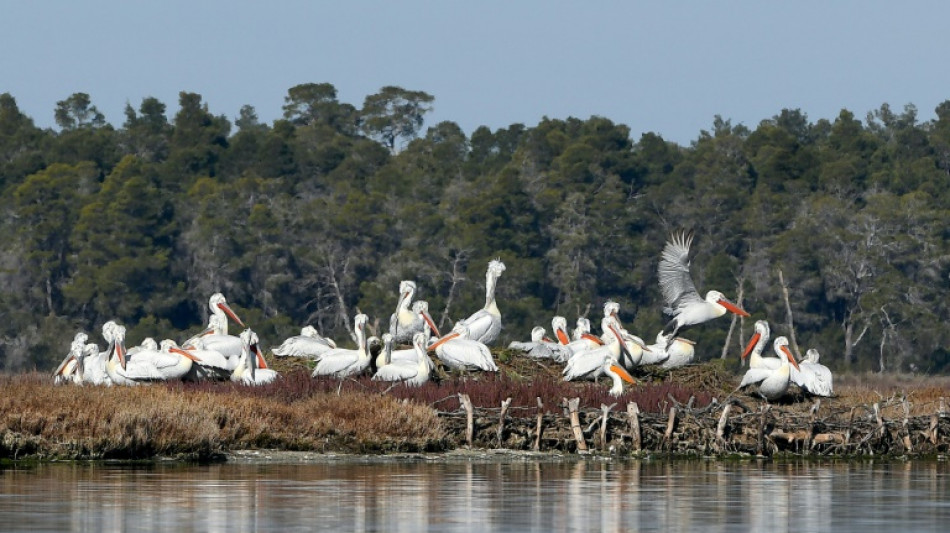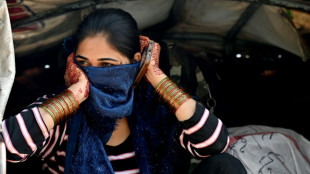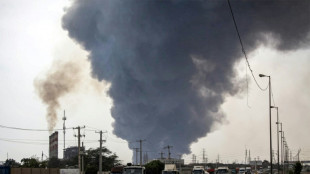
-
 South Korea's Ryu and Japan's Saigo share LPGA Chevron lead
South Korea's Ryu and Japan's Saigo share LPGA Chevron lead
-
Canada leaders make closing pitches in campaign upended by Trump

-
 De Bruyne's Man City exit 'so difficult' for Guardiola
De Bruyne's Man City exit 'so difficult' for Guardiola
-
'No regrets' for Amorim over Man Utd move

-
 Lyon and Strasbourg win to close in on Europe, Montpellier relegated from Ligue 1
Lyon and Strasbourg win to close in on Europe, Montpellier relegated from Ligue 1
-
Toulouse thrash Castres as Top 14 pursuers stumble

-
 Djokovic crashes to nervous Arnaldi in Madrid opener, Swiatek advances
Djokovic crashes to nervous Arnaldi in Madrid opener, Swiatek advances
-
Olympic champs Russell, Davis-Woodhall win at Drake Relays

-
 Browns end Sanders long draft slide
Browns end Sanders long draft slide
-
Cavs crush Heat, on brink of NBA playoff sweep

-
 Fire rages after major blast at Iran port kills 8, injures hundreds
Fire rages after major blast at Iran port kills 8, injures hundreds
-
Kiwi Beamish wins Penn Relays 1,500m crown with late kick

-
 Mbappe on Real Madrid bench for Clasico Copa del Rey final
Mbappe on Real Madrid bench for Clasico Copa del Rey final
-
England survive France fightback to seal Women's 6 Nations slam

-
 Palace sweep past Villa to reach FA Cup final
Palace sweep past Villa to reach FA Cup final
-
CAF appoint Moroccan Lekjaa first vice-president

-
 Major blast at Iran port kills 5, injures hundreds
Major blast at Iran port kills 5, injures hundreds
-
Rodgers vows to stay with Celtic after fourth successive Scottish title

-
 Ipswich relegated as Newcastle, Chelsea boost top five bids
Ipswich relegated as Newcastle, Chelsea boost top five bids
-
Canada leaders make final pitches in campaign upended by Trump

-
 Mullins -- Ireland's national training treasure
Mullins -- Ireland's national training treasure
-
US, Iran say progress in 'positive' nuclear talks

-
 Mullins emulates O'Brien with second successive trainer's title
Mullins emulates O'Brien with second successive trainer's title
-
Ipswich relegated after one season in Premier League

-
 Just Stop Oil activist group holds final march
Just Stop Oil activist group holds final march
-
Djokovic crashes to nervous Arnaldi in Madrid opener

-
 Syria's Kurds demand 'democratic decentralised' Syria
Syria's Kurds demand 'democratic decentralised' Syria
-
Leverkusen win to delay Bayern and Kane's title party

-
 Buenos Aires farewells native pontiff with tears and calls to action
Buenos Aires farewells native pontiff with tears and calls to action
-
Turkey's opposition says Erdogan's canal plan behind latest arrests

-
 Maresca hails 'nasty' Chelsea as top five bid stays alive
Maresca hails 'nasty' Chelsea as top five bid stays alive
-
Trump raises Putin doubts after Zelensky talks at pope's funeral

-
 Major blast at Iran port kills 4, injures hundreds
Major blast at Iran port kills 4, injures hundreds
-
Napoleon's sword to be sold at auction in Paris

-
 Iran, US discuss nuclear deal in third round of talks
Iran, US discuss nuclear deal in third round of talks
-
Buenos Aires farewells native pontiff with call to action

-
 Warholm sets hurdles world record at Diamond League, Holloway shocked
Warholm sets hurdles world record at Diamond League, Holloway shocked
-
US students 'race' sperm in reproductive health stunt

-
 Wikileaks founder Assange joins crowds for pope funeral
Wikileaks founder Assange joins crowds for pope funeral
-
Leader Marc Marquez claims Spanish MotoGP sprint victory

-
 Celtic win fourth successive Scottish Premiership title
Celtic win fourth successive Scottish Premiership title
-
Jackson ends drought as Chelsea boost top five push

-
 Warholm sets 300m hurdles world record in Diamond League opener
Warholm sets 300m hurdles world record in Diamond League opener
-
Major blast at south Iran port kills 4, injures hundreds

-
 Russia says retook Kursk from Ukraine with North Korean help
Russia says retook Kursk from Ukraine with North Korean help
-
Francis laid to rest as 400,000 mourn pope 'with an open heart'

-
 Trump, Zelensky meet on sidelines of pope's funeral
Trump, Zelensky meet on sidelines of pope's funeral
-
'Shared loss': Filipino Catholics bid Pope Francis farewell

-
 Families unable to reunite as India-Pakistan border slams shut
Families unable to reunite as India-Pakistan border slams shut
-
Major blast at south Iran port injures hundreds


Climate change fuels drop in Albania's migrant birds
Thousands of migratory birds have failed to make their annual visit to Albania's western coast this winter, experts say, pointing to climate change, overfishing and urbanisation as likely factors.
The number of waterbirds recorded in January 2022 in the Divjaka-Karavasta wetlands -- an internationally important wintering site along the European migratory flyway –- was 25 percent lower than at this time last year.
Western Albania recorded the drop during the annual International Waterbird Census, a three-day global event to monitor the migration patterns of waterfowl across the world. Several species are affected by the decline, according to Taulant Bino from the Albanian Ornithological Society.
"We discovered that some 9,000 waterbirds are missing from the Divjaka-Karavasta lagoons compared to last year," said Ardian Koci, head of the Divjaka-Karavasta National Park, where the protected wetlands are located.
Koci told AFP a total of 25,000 birds were counted in Divjaka-Karavasta -– one of the most important wetland ecosystems in the Mediterranean -- during the census on January 15-16, as compared to 34,000 in the survey a year earlier.
"The reasons are multiple but above all, it is global warming that has disrupted the migration and breeding seasons," Koci explained.
Nexhip Hysolokaj, a regional biodiversity expert, said scientists in Albania had tracked a rapid decline in migratory bird populations over the past three years.
- Disruptive weather patterns -
And while scientists say more research is needed to understand exactly how climate change is affecting birds, some point to the simple fact that ever-warmer weather means certain species no longer need to leave their northern breeding grounds when winter comes in order to find food further south.
"If there aren’t extreme temperatures in northern Europe, they prefer not to move, or they just migrate over shorter distances," said Mirjan Topi, the author of the first guide to Albania's birds.
In recent years, several species of migrating geese -- including the Greylag Goose, the White-fronted Goose and the rare Lesser White-fronted Goose, which breeds in the tundra of northern Russia and Scandinavia -- have largely failed to make their winter pilgrimage to Albania's marshes.
The western lagoons are also famous for their resident Greater Flamingos and Dalmatian Pelicans, which have a three-metre wingspan rivalling that of the albatross.
But experts say the breeding cycle of the iconic pelican -- whose fragmented populations are a concern for the long-term stability of the species -- is being disrupted by increasingly erratic weather patterns.
In 2021, the pelicans began breeding at the start of January. This year, the nesting season did not begin until the end of January -- a difference of several weeks -- after a winter that started exceptionally late.
"The pelican breeding season seems to be behind last year," Sajmir Hoxha, an expert in Albania for the French conservation group Noe, told AFP.
Meanwhile, illegal fishing has depleted vital food sources in Albania’s lagoons, and rapid urbanisation is threatening fragile ecosystems, especially in the network of marshes and sand dunes along the tourist magnet that is the Adriatic coast.
To add to the pressures, a sprawling international airport is set to be built near the protected marshlands of the Vjosa-Narta region, just south of Divjaka-Karavasta.
This 100-million-euro ($114-million) project, backed by a Turkish-Swiss consortium, "would directly affect wildlife and is a threat to species that breed there, winter there or stop over there on their way to Divjaka", Topi said.
O.M.Souza--AMWN



